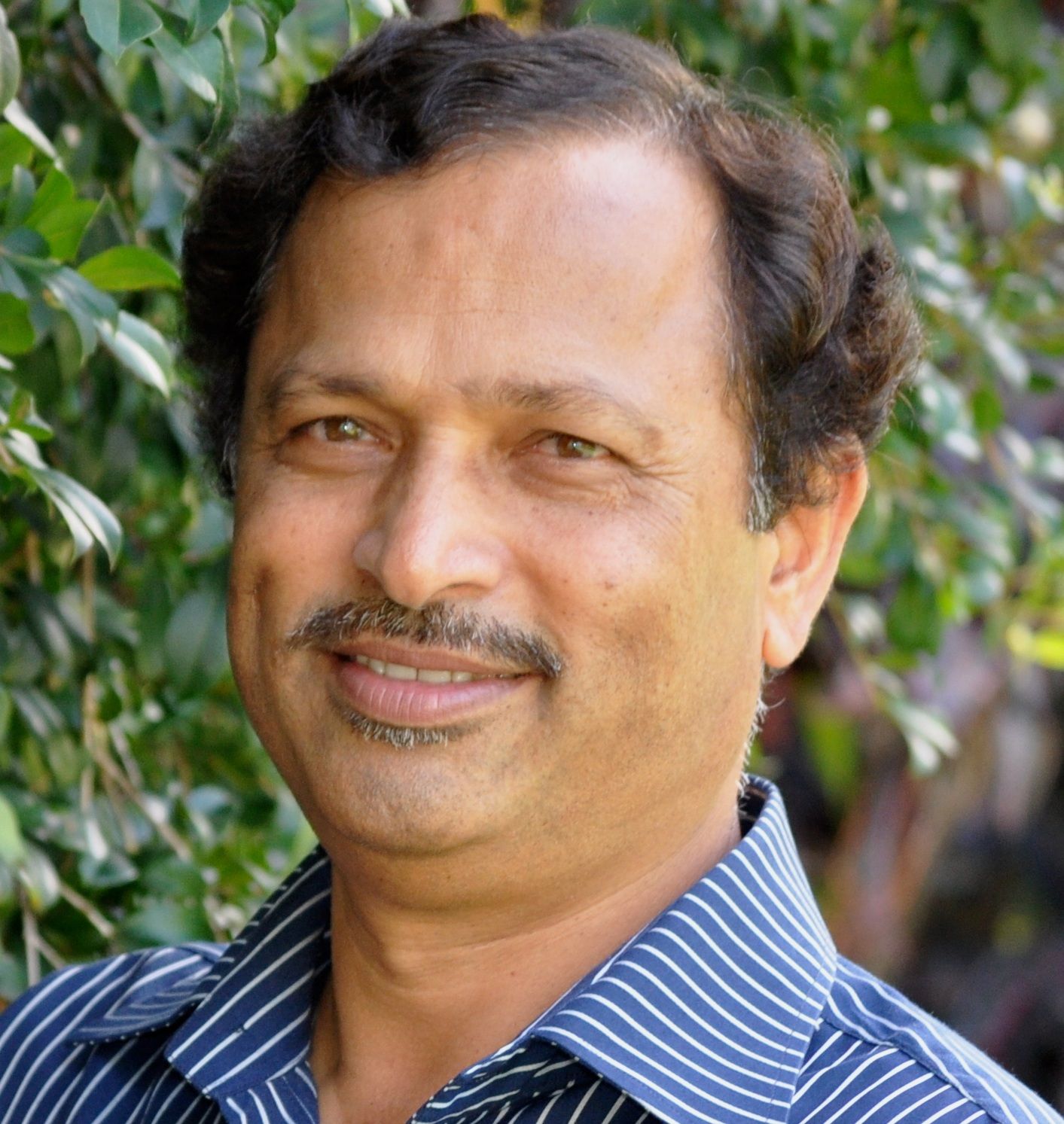
Associate Professor Nanjappa Ashwath
PhD Ecophysiology-ANU Canberra, MSc (Agri) & BSc (Agri)-UAS Bangalore, MAIAST, MEIANZAssociate Professor
School of Health, Medical and Applied Sciences
Centre for Intelligent Systems
+617 49309595 Alternative Phone
CQIRP, 630 Ibis Avenue, Park Avenue QLD 4701 - Bldg 361/ Room 1.16
QLD 4701, Australia
Associate Professor (A/P) Nanjappa Ashwath is an academic and an active researcher. He has been researching Australian plants for over 40 years and is an acknowledged expert in Central Queensland botany. A/P Ashwath has screened 100’s of Australian native species for stress tolerance, biodiesel production, revegetation and other uses. Additionally, he has developed an innovative technology called ‘Phytocapping’ for landfill remediation, and demonstrated its benefits via field trials conducted in QLD, NSW, VIC, SA and WA. As part of this project, he has established active collaboration with various scientists, environmental consultants, landfill owners and regulators.
Currently, he is exploring Australian native species for biofuel (bioethanol; eg agave and biodiesel; eg beauty leaf tree) production from degraded landscapes. He has also helped establish a pyrolysis facility at CQUniversity to convert urban, industrial and agricultural wastes into biofuel. At present he is investigating the use of grape marc and beauty leaf tree in biofuel production.
Associate Professor Ashwath teaches into both undergraduate and postgraduate courses. In the last 26 years, he has taught into almost all 'plant science' courses that were offered by CQUniversity. He now teaches into three courses, viz., "Australian Botany", "Life Science Laboratories" and "Mining, Industrial & Urban Lands Rehabilitation". Nanjappa is popular amongst undergraduate and postgraduate students, and has supervised more than 30 PhD, Masters’ and Honours students.
His passion for research, particularly on Australian native plants, has enabled him to win the highly prestigious "Vice Chancellor’s Researcher of the Year" award in 2001. He has attracted considerable research funds from ARC, CRC, NHT, RIRDC, EPA, mining companies and federal/state governments. He has published over 250 research articles in journals, books and as technical reports. He has an h-index of 35 with 5260 citations. Associate Professor Ashwath collaborates with the researchers at Texas A&M University, QUT, RMIT and Khairun University, Indonesia. He is also an adjunct professor at Amrita University, India. As a Central Queensland expert on Australian plants, he also engages in community services via organising training sessions on plant identification, plant propagation and tissue culture. His contributions to science were recognised by the Rotary Club via the award of 'Rotary International University Fellowship' which helped him promote Australian plants in India.
Background
Nanjappa grew up in a country town in south India. As a child, he found it fascinating to plant a seed and watch it grow and bear fruits. His passion for studying plants made him quit civil engineering and join an agricultural university. After coming to Australia, he fell in love with Australian native plants, so he continued to research on these plants. He regards Australian plants as the "Living Gods" as they can save this Planet from land degradation due to their ability to grow in any soil, no matter how bad it is. Australian plants have been subjected to drought, salinity, waterlogging and heavy metals, in addition to changes in rainfall and temperature. Their adaptation to these conditions, over millions of years, has helped them to evolve stress tolerant plants. Identifying these plants and testing them for their performance on degraded lands, has been the speciality of A/P Ashwath. His research focusses on selecting suitable plants for food, fuel, conservation and land rehabilitation. He is also exploring the use of biological and thermochemical methods of converting biomass into bioethanol, biodiesel, bio-oil, biochar and bioenergy.
Universities Studied At
- Australian National University, Canberra, Australia
- University of Agricultural Sciences, Bengaluru, India
- Sri Sathya Sai Arts & Science College, Brindavan, Bengaluru, India
Universities Worked At
- Australian National University, Canberra, ACT
- CSIRO, Canberra and Brisbane
- Environmental Protection Agency (federal), Jabiru, Northern Territory
- Central Queensland University, Rockhampton, Queensland
Awards
- Vice Chancellor’s Researcher of the Year (2001) award - CQUniversity
- Rotary Foundation University Teaching Fellowship
- ANU Post Graduate Research Fellowship
- Gold Medal in MSc (Agri) - University of Agricultural Sciences, Bengaluru
- 8th rank in B.Sc (Agri) - University of Agricultural Sciences, Bengaluru
- First Class - Pre-University Course
- First class - Higher Secondary School
Media Citations
- CQU Uninews
- Rockhampton Morning Bulletin
- ABC TV
- ABC Radio
- Win TV
Professional Experience
- Member - CQU Academic Board
- Member - CQU Post Graduate Advisory Committee
- Member - Management committee of the Centre for Intelligent Systems
- Chair - Research Committee of the School of Medical & Applied Sciences (2010-2012)
- Associate Director - Natural Resources (Faculty of Science, Engineering & Health)
Professional Memberships
- Australian Institute of Agricultural Science & Technology (AIAST)
- Environmental Institute of Australia & New Zealand (EIANZ)
- Society for Ecological Restoration (SER)
- American Society for Surface Mining & Reclamation (ASSMR)
- Australian Society of Plant Scientists (ASPS)
- Society for Conservation Biology (SCB)
- Society for Growing Australian Plants (SGAP)
- Native Plants Queensland
- Native Plants Capricornia
- Central Queensland Mine Rehabilitation Group
Responsibilities
|
Associate Professor |
School of Medical & Applied Sciences (SMAS) and Centre for Plant & Water Sciences (CPWS) |
|
Board Member Chair Co-ordinator |
CQUni Academic Board School Research Committee (2010-2012) Terrestrial Botany/Australian Botany |
Co-ordinator Co-ordinator Co-ordinator Co-ordinator |
Land Management & Rehabilitation Landscape Ecology & Management Waste Minimisation and Cleaner Production Environmental Management Research Projects A&B |
|
Member |
Divisional Research Committee (FRC) |
|
Member |
Centre for Plant & Water Science - Planning and Development Committee (P&DC) |
|
Member |
CQU's Research Higher Degrees Committee (RHDC) |
|
Member Member Member CQU expert |
CQU's Research Committee of the Academic Board (ReCAB) CQU's Multifaith Reference Group CQU's Sustainability Committee Australian Plants/ Phytoremediation/ Biofuels/ Phytocapping/ Revegetation/ Restoration |
|
CQU expert |
Native Plant Identification and Propagation |
Professional Interests
- Australian native plant identification and propagation
- Conservation of rare and threatened plant species
- Revegetation of degraded lands - mine spoils, heavy metal contaminated sites, mangroves, landfills
- 'Match making': finding suitable plant species for a given habitat (mine site, degraded land, salt or drought affected land)
- Supervising post graduate research students
- Interacting with scientists and entrepreneurs
- Collaboration with innovative scientists
- Helping conserve the habitats
- Creating awareness in smart use of resources
Key Achievements
- Australian Government Innovation Grant - Designing drones for spot application of herbicides
- QLD Department of Science and Environment - Brigalow genetics
- ARC Linkage grant on Landfill Phytocapping http://www.wmaa.com.au/aacap/aacap.html
- ARC Linkage grant on Phytoremediation of arsenic contaminated soils
- NHT grant for developing Native Plant Seedbank for Central Queensland http://www.cqu.edu.au/seedbank/
- ARC LEIF grants- Growth cabinets (CQU) and ICP-MassSpec-HPLC (UniQld)
- Establishment of revegetation strategies for coal mine sites
- Development of an innovative method of remediating landfills (Phytocapping)
- Establishment of field demonstration trials of phytocapping in Brisbane, Noosa, Rockhampton, Townsville, Sydney, Melbourne, Adelaide and Perth
- Completion of PhD and Masters degrees by students (30)
- Successful completion of research projects (>50)
- Development of undergraduate and post graduate courses (6)
- Publication of books, research papers and technical reports (250)
- Attraction of research funds- both NCG and industry (>6 million)
- Liaison with various industry partners and government organisations (city councils, mining companies, govt depts, Universities, CSIRO, research development corporations and other funding agencies)
- Conservation of rare and threatened plant species of Central Queensland- Alectryon ramiflorus, Samadera bidwillii, Stackhousia tryonii
- Restoration of disturbed mangrove habitats - Koorana Crocodile Farm, Gladstone Port Authority
- Development of revegetation practices for uranium mines in Kakadu and Nabarlek
- Stabilisation of railway embankments using green technology
- Phytoremediation of arsenic contaminated sites at Stanwell Power Station
- Smart Irrigation System for parklands of Cairns Regional Council
- Phytoremediation of heavy metal contaminated lakes in Gympie
- Patent on smart irrigation
- Patent on biodiesel conversion
Computer Software
- Fesuk S, Shaw R and Ashwath N (2003). Grasses of Northern Territory – A Lucid key for identification of selected grasses of NT. Primary Industries Research Centre, Central Queensland University, Rockhampton, Australia.
- Ashwath N and Fesuk S (2004). Electronic students key for identification of native plants of Central Queensland. Primary Industries Research Centre, Central Queensland University, Rockhampton, Australia.
Industry Reports
- Wetland rehabilitation report to Gympie Regional Council
- Greenwaste report to Rockhampton City Council
- Phytoremediation report to Gympie Regional Council
- Phytocapping report to Waste Management Association of Australia
- Revegetation report to Angloamerican Coal
- Vegetation survey report to Lagoon Hill Nickel
- Tissue Culture report to pineapple farmers
- In vitro culture report to wasabi grower
- Mangrove restoration report to Gladstone Port Corporation
- Uranium mine restoration report to Ranger Mine
- Effluent irrigation report to Livingstone Shire Council
- Rail embankment stabilisation report to Queensland Rail
- Arsenic contaminated site remediation report to Stanwell Power Station
- Landfill leachate testing report to Brisbane City Council
- Landfill phytocapping report to Noosa Shire council
- ARC phytocapping report to Townsville City Council
- Smart Irrigation report to Cairns Regional Council
Editor
- Editorial board Annals of Ecology and Environmental Science (https://www.sryahwapublications.com/annals-of-ecology-and-environmental-science/
- Editorial board Agriculture and Natural Resources
- Editorial Board Journal of Environmental Protection
- (http://www.vinanie.com/jebr/editorial_Board.html)
-
Editorial board Journal of Environment & Biotechnology
Research - Guest Editor Biomedical Research International “special edition”
-
Guest Editor International Journal of Environmental Technology
and Management, Special edition; Inderscience Publishers -
Guest Editor Special Volume “Toxicity of Environmental Contaminants”
of Biomedical Research International, Volume 2015, Article number 702439 (http://dx.doi.org/10.1155/2015/702439) - Editor of the journal Energies special edition “Current Trends in Biomass Pyrolysis for Biofuel Production” https://www.mdpi.com/journal/energies/special_issues/current_trends_in_biomass_pyrolysis
- Editor of the book “Mining Technology" by Intech Open Limited, London
Consultancy Work
- Revegetation
- Plant Propagation
- Plant Tissue Culture
- Biodiesel Testing
- Thermal conversion of biomass
- Soil Testing
- Minesite Rehabilitation
- Vegetation Survey
- Environmental Impact Assessment
- Seed testing
- Microbiological assessment
- Waste management
- Contaminated site remediation: phytoremediation, phytocapping
- Smart irrigation
- Sustainable waste management
- Waste to energy conversion
- Organising Training sessions on the above topics
- Flora survey
- Revegetation of difficult sites
- Selection of suitable plant species and cultivation practices for landscaping
Lake Alford Water/Soil Quality Improvement Tier 1
Grant: Government Tender (Category 2: Other Public Sector)
Funding Schemes: Gympie Regional Council
Total Funding: $31,621.35
Smart Sensor Systems for Parks Water Management in Cairns Regional Council area
Grant: Contract Research (Category 2: Other Public Sector)
Funding Schemes: Cairns Regional Council
Total Funding: $168,083.64
Conservation of Quassia bidwillii at Callide Mine, Central Queensland
Grant: Scholarship (Not Specified )
Funding Schemes: Anglo American Contract Research
Total Funding: $186,775.00
Accreditation
I am currently accredited for supervision in the following:
- 4011 Environmental Engineering
- 4102 Ecological Applications
- 4103 Environmental Biotechnology
Current Capacity
Current Supervision
Complete Supervision
Forestry Sciences - Tree Nutrition and Physiology
Plant Biology - Plant Physiology
Plant Biology - Plant Physiology
Inorganic Chemistry - Bioinorganic Chemistry
Chemical Engineering - Chemical and thermal processes in energy and combustion
Resources Engineering and Extractive Metallurgy - Resources Engineering and Extractive Metallurgy not elsewhere classified
Environmental Science and Management - Environmental Rehabilitation (excl. Bioremediation)
Expertise
• Selection of native plants for biofuel production
• Bioethanol production from Agave species
• Phytoremediation of heavy metal contaminated sites
• Phytocapping of municipal landfills
• Mine site rehabilitation
• Biodiversity conservation
• Biochar effects on plant production and soil health
• Plant tissue culture and genetic studies
• Productive use of waste lands
• Solid waste management
• Waste to bioenergy conversion
• Supervision of research students
Major Projects
• Phytocapping of landfill sites- National collaborative project (ARC linkage with 5 other universities, CSIRO and the WMAA)
• Biodiesel production from beauty leaf tree (RIRDC)
• Phytoremediation of arsenic contaminated soils using Chinese Brake Fern (ARC)
• Native plant seedbank for Central Queensland (NHT)
• Revegetation of coal mine sites (Anglocoal)
• Conservation of Samadera bidwillii (Callide mine)
• Revegetation of high voltage power line corridors (Powerlink)
Public Health and Health Services - Preventive Medicine
Environmental Biotechnology - Bioremediation





